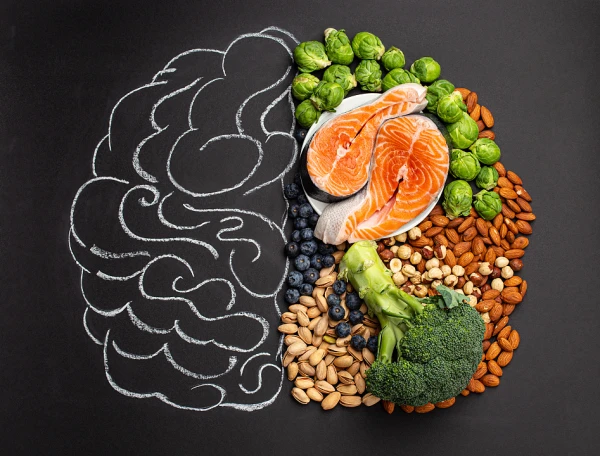
Supporting the brain is easier than it seems. We explain how nutrition helps improve memory, concentration, and work without overloads. When the workload increases – deadlines are pressing, studies are burdened with exams, and concentration drops after lunch – the body almost always hints at one thing: the brain needs support. And not in the form of "some snack," but in the form of specific foods that genuinely improve memory, attention, and information processing speed. No magic – just nutrition that works physiologically.
Here is a selection of foods that you should add to your diet to help your brain activate faster, work more steadily, and tire less quickly.
Nuts
Nuts provide the brain with what it needs to function for a long time without energy spikes: healthy fats, vitamin E, and antioxidants, reports RidLife. They support cognitive functions and improve the ability to maintain attention throughout the day.
Walnuts, almonds, hazelnuts – any will do. The key is the portion size. The norm for an adult is about a small handful. This is enough to nourish the brain without overeating extra calories.
Berries
The main benefit of berries comes from flavonoids. They reduce inflammation, protect brain cells from oxidative stress, and help form resilient neural connections.
Blueberries, raspberries, currants, strawberries – any berries work equally well. They help you memorize information faster and recover details more easily after a load.
Plus, berries are convenient to add anywhere: to porridge, yogurt, cottage cheese, smoothies.
Fatty Fish
Omega-3 is essentially the building material for the brain. These fatty acids help cells transmit signals faster and more efficiently.
Salmon, mackerel, sardines, trout – perfect. Regular consumption improves concentration, stabilizes mood, and reduces the feeling of mental fatigue at the end of the day.
Eating fish 2–3 times a week is sufficient for the effect.
Eggs
Eggs contain choline – a substance needed for the synthesis of the neurotransmitter acetylcholine. It directly affects memory and the ability to learn.
A breakfast with eggs significantly eases the "activation process" and helps maintain attention on complex tasks. Eggs pair easily with vegetables and whole grains – resulting in a balanced meal that keeps energy stable.
Dark Chocolate
Cocoa beans contain flavonoids that improve blood flow to the brain. This helps you stay alert and maintain concentration without sugar spikes.
Chocolate should have at least 70% cocoa content. The portion is 2–3 squares or a little grated chocolate in porridge or yogurt.
Whole Grains
The brain is the most energy-dependent organ. If you only provide it with fast carbohydrates, energy will spike and then crash.
Whole grains provide a slow, steady flow of glucose: oatmeal, quinoa, buckwheat, bulgur. This helps the brain function evenly, without "lulls" in the second half of the day.
A good strategy is to add complex carbohydrates to every main meal.
Greens
Spinach, arugula, Swiss chard, parsley – leafy greens are rich in folates, vitamin K, and antioxidants. They support neuron function and help recover faster after information overload.
Add greens to warm dishes, salads, or smoothies – the effect is cumulative.
The Brain Needs Variety, Not Superfoods
For stable concentration, it’s not just one "magic product" that matters, but a combination: healthy fats, complex carbohydrates, antioxidants, vitamins, and omega-3. Regularly including nuts, fish, eggs, berries, greens, and whole grains in your diet makes the brain work noticeably more efficiently – without caffeine overloads and chaotic snacking.












